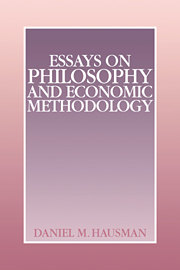Book contents
- Frontmatter
- Contents
- Introduction: What is philosophy of economics?
- PART I METHODOLOGY AND THEORY APPRAISAL
- PART II CAUSALITY IN ECONOMICS
- PART III CASES AND PUZZLES
- PART IV POSTSCRIPTS
- 16 How to do philosophy of economics
- 17 Reflections on philosophy and economic methodology
- Bibliography of relevant writings by Daniel M. Hausman
- Bibliography of works by other authors
- Index
17 - Reflections on philosophy and economic methodology
Published online by Cambridge University Press: 05 June 2012
- Frontmatter
- Contents
- Introduction: What is philosophy of economics?
- PART I METHODOLOGY AND THEORY APPRAISAL
- PART II CAUSALITY IN ECONOMICS
- PART III CASES AND PUZZLES
- PART IV POSTSCRIPTS
- 16 How to do philosophy of economics
- 17 Reflections on philosophy and economic methodology
- Bibliography of relevant writings by Daniel M. Hausman
- Bibliography of works by other authors
- Index
Summary
Most methodological writing is by economists, and indeed almost all leading economists have tried their hand at it. The large literature concerned with economic methodology is of uneven quality, and there is striking disparity between the quality of the economic contributions and of the methodological reflections of major economists. If one read only their methodology, one would have a hard time understanding how Milton Friedman or Paul Samuelson could have won Nobel Prizes. It is less surprising that such economists scorn philosophizing than that they do so much of it.
Methodological reflections on economics pose other puzzles, too. Although this literature is heavily influenced by philosophy, it is not a part of philosophy. This quasi-autonomy is peculiar, since the methodological literature is concerned with apparently the same questions that occupy philosophers of science. Why is economic methodology a separate subdiscipline? Is it the same inquiry as philosophy of economics under another name? What are the prospects for bridging disciplinary boundaries and for strengthening the collaboration between economists and philosophers?
When I first started thinking about this question a dozen years ago, I was inclined to blame it all on the logical positivists. After all, up-to-date philosophers of science in the late 1970s blamed the logical positivists for everything else. From what I took to be the logical positivist's perspective, someone concerned with “economic methodology” must either be applying the general insights of the logical positivists, analyzing particular economic concepts, or doing some sort of applied psychology or sociology.
- Type
- Chapter
- Information
- Essays on Philosophy and Economic Methodology , pp. 230 - 236Publisher: Cambridge University PressPrint publication year: 1992



